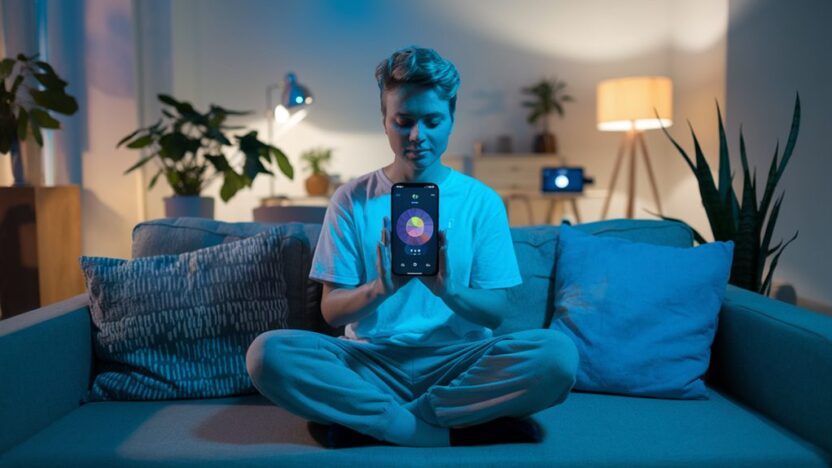Technology offers powerful tools to help you manage depression more effectively in today's digital world. You'll find mental health apps for mood tracking and meditation, telemedicine platforms for connecting with therapists from home, and virtual support communities where you can share experiences with others who understand. Digital self-care strategies, including guided breathing exercises and sleep tracking, put wellness tools right at your fingertips. While these technologies shouldn't replace professional treatment, they can provide valuable support between sessions and help you maintain daily mental wellness routines. There's much more to discover about how technology can support your mental health journey.
Understanding Modern Mental Health Apps

Mental health apps have surged in popularity over the past few years, offering support right from within your smartphone. These digital tools provide various features, from mood tracking and meditation guides to cognitive behavioral therapy exercises, making mental health support more accessible than ever before.
Additionally, some apps may provide insights into managing anxiety that relate to the effects of medications like benzodiazepines and SSRIs, which can have both benefits and risks anxiety medications overview.
When you're looking for mental health apps, you'll find they generally fall into several categories. Some apps focus on meditation and mindfulness, helping you practice staying present and managing anxiety.
Others serve as digital journals, allowing you to track your moods, identify triggers, and spot patterns in your emotional well-being. There are also apps that connect you directly with licensed therapists through text, voice, or video calls.
Before choosing a mental health app, you'll want to evaluate factors like privacy settings, user reviews, and whether it's backed by mental health professionals.
While these apps can be helpful tools in managing depression, they work best when used alongside professional treatment, not as a replacement.
Remember to check if the app you're interested in is verified by healthcare organizations or has research supporting its effectiveness.
Telemedicine for Depression Treatment
Building on the digital evolution of mental healthcare, telemedicine has revolutionized how people access depression treatment. Through secure video platforms and specialized apps, you'll find that teletherapy for depression offers a convenient, private way to connect with mental health professionals from the comfort of your home.
Additionally, many of these platforms incorporate essential digital tools designed to help manage anxiety and depression, enhancing the overall treatment experience. You're now able to receive expert care without traveling to an office, making treatment more accessible than ever before.
Here's what you can expect from telemedicine depression treatment:
- Flexible scheduling options that work around your commitments, including evening and weekend appointments that traditional clinics mightn't offer.
- Access to a wider selection of therapists and psychiatrists who specialize in depression treatment, regardless of your location.
- Real-time prescription management and adjustments through virtual consultations with your healthcare provider.
You'll discover that telemedicine sessions feel similar to in-person visits, with the added benefit of being in your preferred environment. Your provider can monitor your progress, adjust your treatment plan, and offer support through secure messaging systems between appointments, ensuring you're never far from the help you need.
Virtual Support Communities

Countless individuals struggling with depression have found solace in virtual support communities, where shared experiences foster understanding and healing.
These online spaces not only provide a platform for connection but also encourage practices like mindfulness, which can greatly improve emotional well-being embracing mindfulness. You'll discover these online spaces offer 24/7 access to peers who truly understand what you're going through, making them valuable digital mental health solutions for those seeking connection and support.
These virtual communities come in various forms, including moderated forums, social media groups, and specialized mental health apps. You can participate actively by sharing your story, offering support to others, or simply reading others' experiences to feel less alone.
Many platforms offer features like anonymous posting, which lets you express yourself freely without fear of judgment.
When you're looking for a virtual support community, you'll want to choose one that's well-moderated and maintains clear safety guidelines. The best communities often have mental health professionals who oversee discussions, guarantee accurate information sharing, and step in during crisis situations.
You'll also find that many platforms offer additional resources, such as mood tracking tools, guided discussions, and educational materials about depression management.
Digital Mental Health Privacy
Privacy concerns in digital mental health spaces remain a significant consideration for anyone seeking online support. When you're exploring online counseling options, it's important to understand how your personal information and conversations are protected, stored, and potentially shared with others.
Many digital platforms now offer encrypted messaging and secure video calls, but you'll want to verify these safety measures before sharing sensitive information.
Here are key privacy aspects you'll need to reflect on:
- Data encryption standards used by the platform, including whether your messages and video sessions are protected end-to-end.
- The platform's policy on storing your conversation history and personal information, including how long they keep records.
- Third-party sharing agreements and whether your anonymous data might be used for research or advertising purposes.
You should always read the privacy policy carefully and look for platforms that comply with healthcare privacy regulations.
When you're sharing personal mental health information online, it's vital to understand your rights and the platform's responsibilities. Don't hesitate to ask questions about privacy measures before starting online counseling sessions, as your digital security should be a top priority.
Technology-Assisted Self-Care Strategies

Modern technology's role in self-care has revolutionized how we manage daily mental wellness. Through your smartphone or computer, you'll find countless tools that can help you maintain good mental health, from meditation apps to mood tracking software. These digital companions serve as around-the-clock support systems, complementing traditional therapy approaches.
By incorporating mindfulness techniques, you can enhance your self-care routine and further reduce stress levels, as harnessing mindfulness can help you focus on the present moment and cultivate awareness.
You can now access guided breathing exercises, stress-management techniques, and personalized self-care reminders at your fingertips. Many apps offer features that help you establish healthy routines, track your sleep patterns, and monitor your emotional well-being over time.
When combined with professional therapy, these technology-based tools can strengthen your overall mental health strategy.
To make the most of these resources, you'll want to choose apps that align with your specific needs and daily schedule. Look for features like progress tracking, customizable reminders, and evidence-based exercises.



